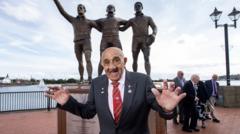Are Teachers Mocking the Kirk Murder Exposing a Moral Crisis in Education?

Published: 2025-09-14 07:34:13 | Category: policy GNEWS Search
The assassination of Charlie Kirk has ignited a fierce debate about the state of public discourse and the role of educators in shaping ideas within our institutions. It highlights alarming reactions from some educators, revealing a troubling trend that raises concerns over ideological biases in the education system.
Last updated: 22 October 2023 (BST)
Key Takeaways
- The reactions to Kirk's assassination from some educators showcase a troubling trend in public discourse.
- Concerns are growing over ideological biases in the education system.
- There is increasing advocacy for school choice as a response to controversial educational policies.
- The incident has sparked renewed scrutiny of the role of educators in shaping political discourse.
- Parents are becoming more vocal about their children's education and the political ideologies being taught.
The Incident: What Happened?
On a seemingly ordinary day, Charlie Kirk, a prominent conservative speaker and activist, was assassinated during a debate at a university campus. This shocking event has sent ripples through the American political landscape and has ignited a barrage of reactions, particularly from those within the educational sector.
In the wake of Kirk’s death, several faculty members and educators reportedly posted insensitive comments on social media, some even expressing glee at his demise. These reactions have raised questions about the moral compass of those tasked with educating future generations.
The Reactions: A Disturbing Trend
One of the more shocking responses came from a math teacher at Beekmantown Central School, who reportedly celebrated Kirk's death with a post that read, “At least he died happy… surrounded by white folk!” Such comments not only reflect a lack of empathy but also an alarming acceptance of violence against those with differing views.
In a letter to New York Governor Kathy Hochul, Rep. Elise Stefanik condemned these comments, highlighting the absence of moral character among educators who resort to mocking a murder. She cited instances of other educators who made similarly distressing remarks, including a biology teacher from Texas who ominously stated, “1 down. Now get the rest of these fools.”
These instances are not isolated but rather indicative of a broader cultural decay in the realm of public discourse, especially within educational institutions.
The Broader Context: Polarisation in Education
The reactions to Kirk's assassination underscore a growing polarisation within American education. Increasingly, educators are seen as promoting radical ideologies that can alienate students and parents alike. This has prompted a backlash from parents who have long expressed concerns about the content being delivered in classrooms, particularly regarding policies surrounding mask mandates, vaccine requirements, and sex education.
This backlash has been manifested in protests at school board meetings across the nation, where parents have taken a stand against what they perceive as overreach by educational authorities. The situation escalated to the point where the National School Boards Association requested federal intervention, leading to Attorney General Merrick Garland directing the FBI to investigate threats against school officials.
The Call for School Choice
In light of these events, many are calling for a renewed push for school choice, arguing that parents should have the autonomy to select educational environments that align with their values and expectations. The notion is simple: parents should not have to worry about their children being taught by individuals who display a lack of respect for differing viewpoints.
Advocates for school choice argue that it could lead to improved educational outcomes and greater accountability among educators. If parents can choose schools that reflect their values, children may receive a more balanced education, free from the ideological biases that have become increasingly prevalent.
The Economic Argument: Cost vs. Quality
Former President Biden's attempts to alleviate student loan burdens raised questions about the economic implications of education policy. Critics of school choice often cite the costs associated with school vouchers as a concern. However, proponents argue that investing in school choice is a more beneficial long-term strategy, potentially yielding economic dividends by fostering a more educated populace.
In contrast to the significant financial implications of forgiving student loans, the costs of school choice initiatives could be seen as an investment in the future of American education. A well-educated citizenry is likely to contribute positively to society, ultimately outweighing the initial financial outlay.
Conclusion: A Critical Moment for American Education
The assassination of Charlie Kirk is more than just a tragic event; it serves as a wake-up call about the ideological battles that are shaping American education. As educators grapple with their responsibilities in a politically charged environment, the need for reform is more pressing than ever. Parents are right to demand transparency and accountability in what their children are learning.
This incident may serve as a catalyst for meaningful change in the education system, potentially leading to a future where students are taught to think critically and engage respectfully with differing viewpoints. As we navigate this tumultuous period, a question remains: how can we ensure that education remains a place for constructive dialogue rather than a breeding ground for division?
#EducationReform #SchoolChoice #PublicDiscourse
FAQs
What happened to Charlie Kirk?
Charlie Kirk was assassinated during a debate at a university campus, sparking widespread outrage and reactions from various sectors, particularly educators.
What was the reaction from educators?
Some educators reportedly made insensitive comments on social media celebrating Kirk’s death, highlighting concerning ideological biases within the education system.
What is the significance of the calls for school choice?
The calls for school choice reflect a desire for parents to have the ability to select educational environments that align with their values, especially in light of controversial teacher responses to Kirk's assassination.
How has the public responded to educational policies?
Public response has included protests against various educational policies, with parents voicing concerns over what their children are being taught and the influence of ideological biases in schools.
What are the economic arguments for school choice?
Proponents argue that investing in school choice can lead to better educational outcomes and a more educated populace, outweighing the initial costs associated with such initiatives.



